

Saturday, March 22, 2025
Kevin Anderson
Bespoke Software Development: A Complete Guide
Off‐the‑shelf software solutions may suffice for some businesses, but in industries with unique requirements or specialized processes, bespoke software development provides a powerful advantage. A tailor‐made application can align perfectly with your organization’s workflows, ensuring higher efficiency, seamless scalability, and minimal clutter. This article explores every aspect of bespoke development in 2025, from understanding what it is and why it matters to selecting a suitable vendor and applying agile methodologies for flexible, future‐proof solutions.
Table of Contents
- What Is Bespoke Software Development?
- Why Choose Bespoke Over Off‑the‑Shelf?
- Advantages of Agile in Bespoke Software Development
- Choosing a Software Development Company for Bespoke Solutions
- Bespoke Software Development Services and Engagement Models
- Key Features of a Successful Bespoke Application
- Common Use Cases and Industries
- Cost and ROI of Bespoke Software
- Frequently Asked Questions
- Conclusion

What Is Bespoke Software Development?
Bespoke software development refers to designing and building custom applications from the ground up to meet specific business needs. Unlike off‑the‑shelf products, these tailored systems aim to reflect a unique set of requirements, integrations, and workflows. A bespoke software development company typically collaborates closely with stakeholders—executives, department heads, IT managers—to understand the intricacies of a project before crafting a completely personalized solution.
This approach ensures that every feature, dashboard, user flow, and integration is designed precisely around how your organization operates, without unnecessary add‑ons. From bespoke business software development that automates day‑to‑day tasks to more complex systems used in specialized industries—such as healthcare, logistics, or finance—the outcome is a solution that truly belongs to you.
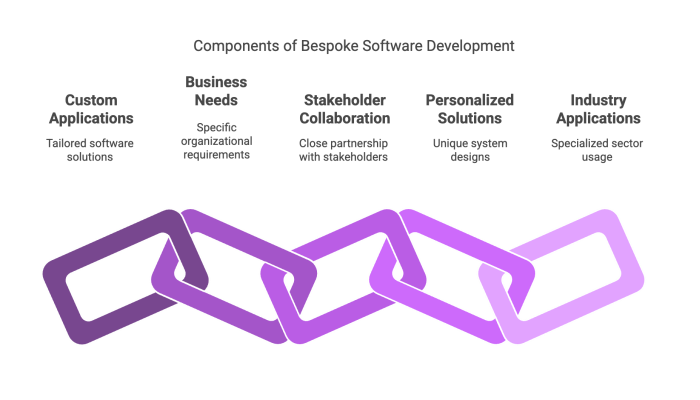

Why Choose Bespoke Over Off‑the‑Shelf?
Off‑the‑shelf software usually provides a broad feature set that may not always match your exact needs. In contrast, bespoke software development services focus on building only the functionality you require. This means no redundant modules or forced workflows—just a solution that is perfectly aligned with your business processes.
Custom development allows for:
- Perfect Fit: Tailor-made features that integrate seamlessly with your unique workflows.
- Long-Term Scalability: As your business grows, your custom solution can be easily extended with new features or integrated technologies.
- Ownership and Control: Full ownership of the source code and intellectual property, eliminating ongoing subscription fees and vendor lock-in.
- Competitive Differentiation: Unique functionalities that set your business apart in the market.
- Better Security: Custom security measures can be built into the system from the ground up, reducing the risk of vulnerabilities common in widely used commercial products.
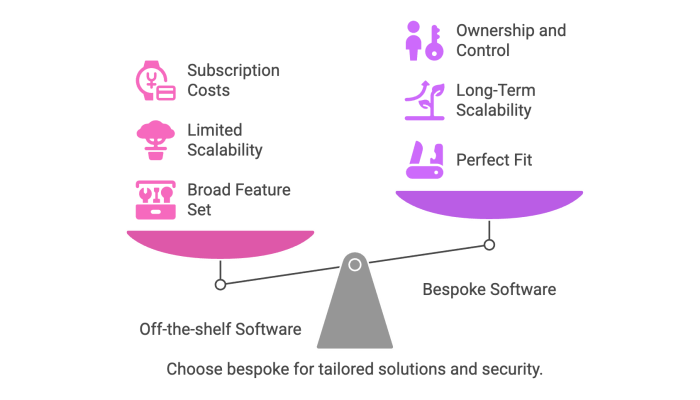

Advantages of Agile in Bespoke Software Development
Agile methodologies are particularly valuable in bespoke software development because they allow for continuous iteration and refinement. By breaking the project into manageable sprints, teams can deliver functional product increments, gather feedback, and adjust rapidly to evolving requirements. This iterative approach minimizes risk and ensures that the final product closely aligns with user needs.
- Early and Frequent Feedback: Regular sprint reviews allow stakeholders to validate features and suggest improvements.
- Iterative Delivery: Instead of waiting for a monolithic release, agile sprints deliver working software in short cycles.
- Risk Mitigation: Issues are identified and resolved early in the development process, reducing costly rework.
- Flexibility for Changing Needs: Agile sprints accommodate new requirements, whether from shifting market demands or regulatory updates.
- Collaborative Culture: Daily stand-ups and retrospective meetings foster transparency and continuous improvement among cross-functional teams.
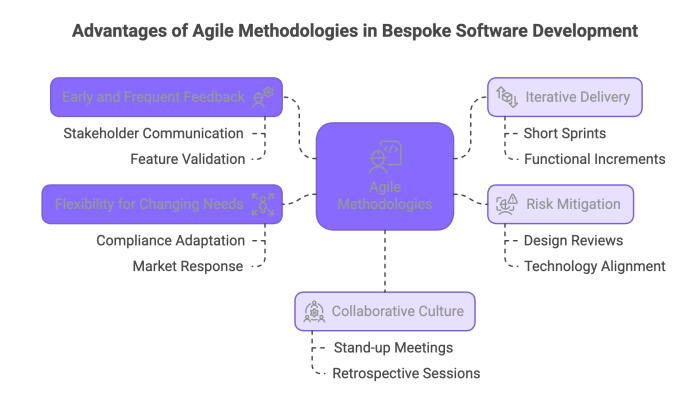

Choosing a Software Development Company for Bespoke Solutions
Selecting the right partner is crucial when embarking on a bespoke software development project. A reputable development company should have:
- Proven Track Record: A strong portfolio of projects similar to yours, demonstrating expertise in creating custom solutions for specialized industries.
- Technical Expertise: Proficiency in relevant programming languages and frameworks, as well as experience with advanced technologies like AI and IoT if needed.
- Cultural and Communication Fit: Transparent agile practices, regular updates, and a collaborative approach that ensures your vision is accurately implemented.
- Security and Compliance Focus: A deep understanding of industry-specific regulations and best practices for data protection.
- Client References: Direct feedback from past clients can provide invaluable insights into the vendor’s reliability and performance.
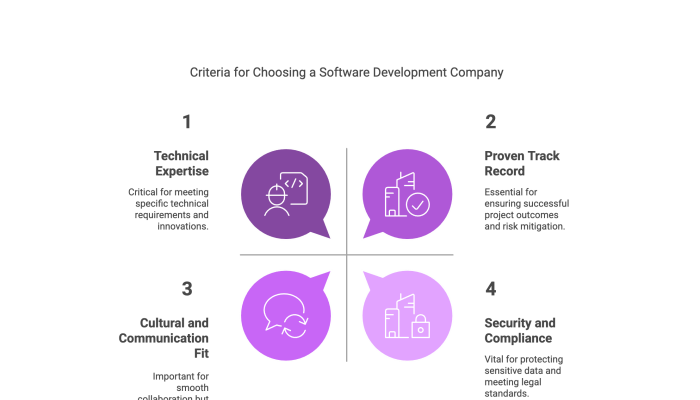

Bespoke Software Development Services and Engagement Models
Bespoke projects can be executed under different engagement models depending on your project’s scope and requirements.
Common models include:
- Fixed Price: Ideal for smaller, well-defined projects where all requirements are established upfront.
- Time and Material (T&M): Suitable for projects with evolving scopes, where you pay for the actual hours worked and resources used.
- Dedicated Team: A full-time, cross-functional team is assigned to your project, which is particularly beneficial for long-term or complex developments.
- Hybrid Models: Combining elements of T&M and fixed price, often used to manage risk during initial phases and then transition to a more structured model.
This flexibility in engagement allows you to choose the approach that best fits your business needs and risk tolerance, ensuring efficient use of resources and timely delivery.
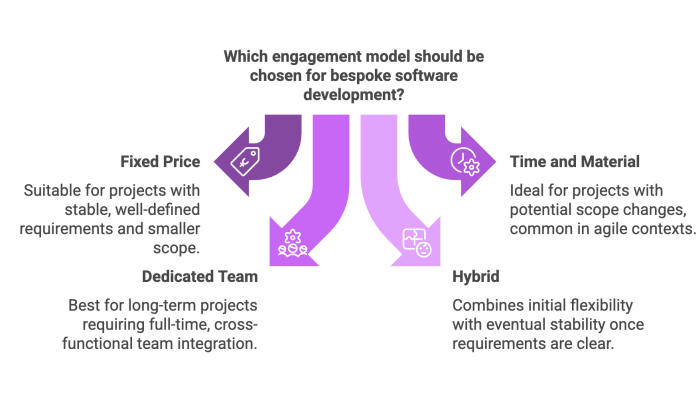

Key Features of a Successful Bespoke Application
Successful bespoke applications are designed to meet precise business needs while remaining flexible for future growth.
Core features typically include:
- User-Centric Design: An intuitive interface that reduces training time and boosts user adoption.
- Robust Integration: Seamless connectivity with existing systems such as ERPs, CRMs, or specialized tools to centralize data and processes.
- Scalability and Flexibility: Architectures built on microservices or containerization allow independent scaling of features as usage grows.
- Data Security: End-to-end encryption, strict access controls, and compliance-specific protocols ensure that sensitive information is protected.
- Automation: Automating routine tasks like data entry, report generation, or workflow management minimizes human error and improves efficiency.
- Analytics and Reporting: Real-time dashboards and advanced analytics provide actionable insights to drive business decisions.
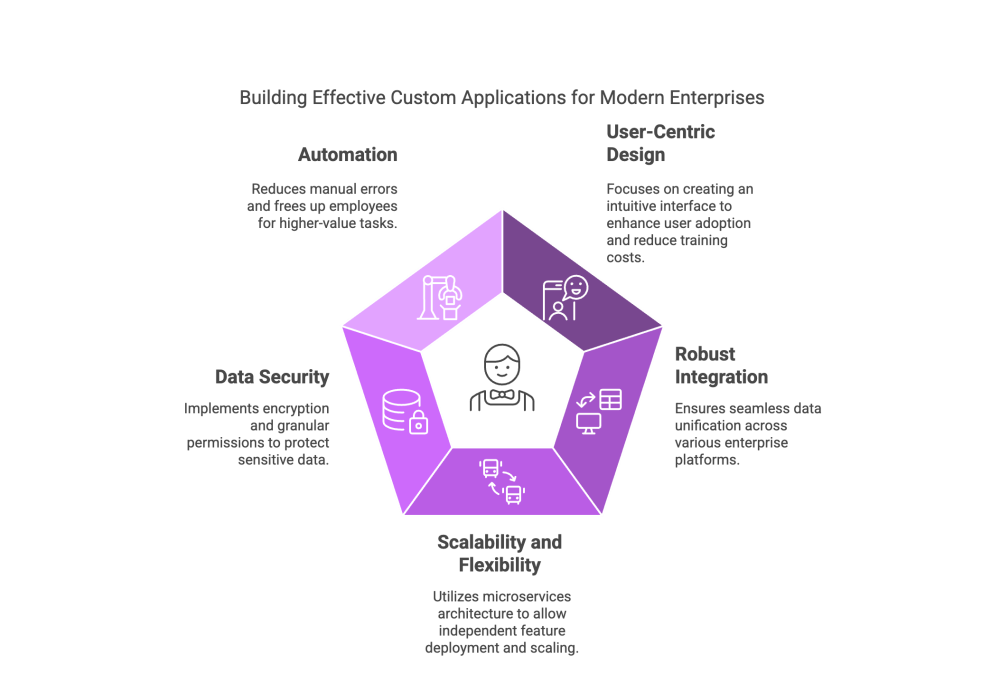

Common Use Cases and Industries
Bespoke software solutions are especially valuable in industries with unique operational demands.
Typical use cases include:
- Manufacturing: Custom systems for production scheduling, quality control, and supply chain optimization.
- Finance: Tailored applications for secure payment processing, risk assessment, and compliance management.
- Healthcare: Solutions that integrate with EHR/EMR systems, facilitate telemedicine, and ensure regulatory compliance.
- Retail & E-commerce: Custom CRM, inventory management, and personalized marketing platforms.
- Logistics: Transportation management systems (TMS) that optimize routes, track shipments, and coordinate with multiple carriers.
These bespoke solutions help organizations achieve higher operational efficiency, reduce costs, and gain a competitive edge in their respective markets.
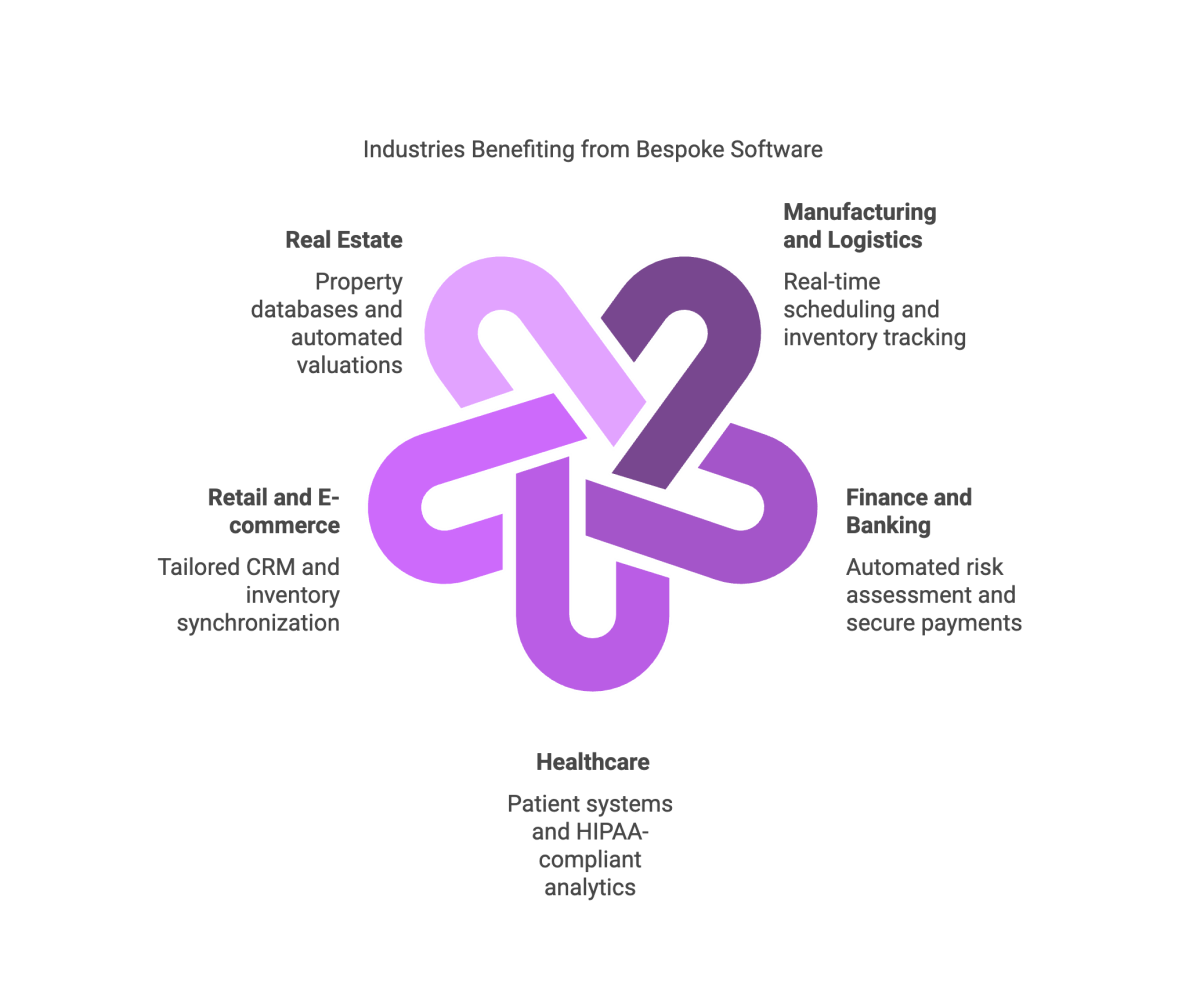

Cost and ROI of Bespoke Software
Understanding the financial implications of bespoke software development is crucial for planning your investment.
Several factors influence cost:
- Project Scope & Complexity: More advanced features such as AI, blockchain, or extensive integrations can significantly increase development time and expense.
- Team Composition: The number and expertise of specialists—developers, QA, DevOps, business analysts—impact overall costs.
- Region & Vendor: Development costs vary by location; vendors in regions like India or Eastern Europe might offer more competitive rates compared to those in Western Europe or North America.
Typical cost ranges include:
- Simple Application: $10,000 – $150,000+
- Mid-Level Platform (e.g., Investment/Robo-Advisory): $50,000 – $300,000+
- Complex Enterprise Solution: $100,000 – $500,000+ (or more, depending on scale and features)
ROI can be measured through efficiency gains, increased revenue from enhanced features, and savings on operational costs by automating manual processes. A custom solution that delivers measurable improvements in these areas can quickly justify its initial investment.
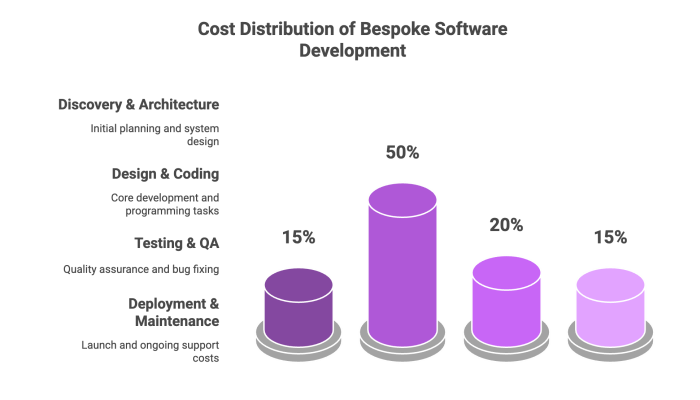

Frequently Asked Questions
Below are some common questions regarding bespoke software development:
- What Is Bespoke Software Development? – It is the process of creating custom applications tailored specifically to an organization’s unique needs, as opposed to using generic off-the-shelf solutions.
- Why Choose Bespoke Over Off-the-Shelf? – Bespoke solutions are designed to fit your exact workflows and processes, offering enhanced scalability, security, and competitive differentiation.
- What Are the Main Advantages of Using Agile in Bespoke Development? – Agile methodologies enable iterative delivery, continuous feedback, and rapid adaptation to changing requirements, reducing risk and ensuring the final product aligns with user needs.
- How Do I Choose a Software Development Company for Bespoke Solutions? – Evaluate potential partners based on their portfolio, technical expertise, communication style, security and compliance practices, and client references.
- What Is the Typical Cost of Bespoke Software Development? – Costs vary widely depending on project scope, complexity, and team composition, ranging from five figures for simpler applications to six or seven figures for large-scale, complex systems.
- How Can Bespoke Software Drive Competitive Differentiation? – Custom solutions provide unique functionalities and integrations that standard products can’t offer, giving your business a distinct edge in your industry.
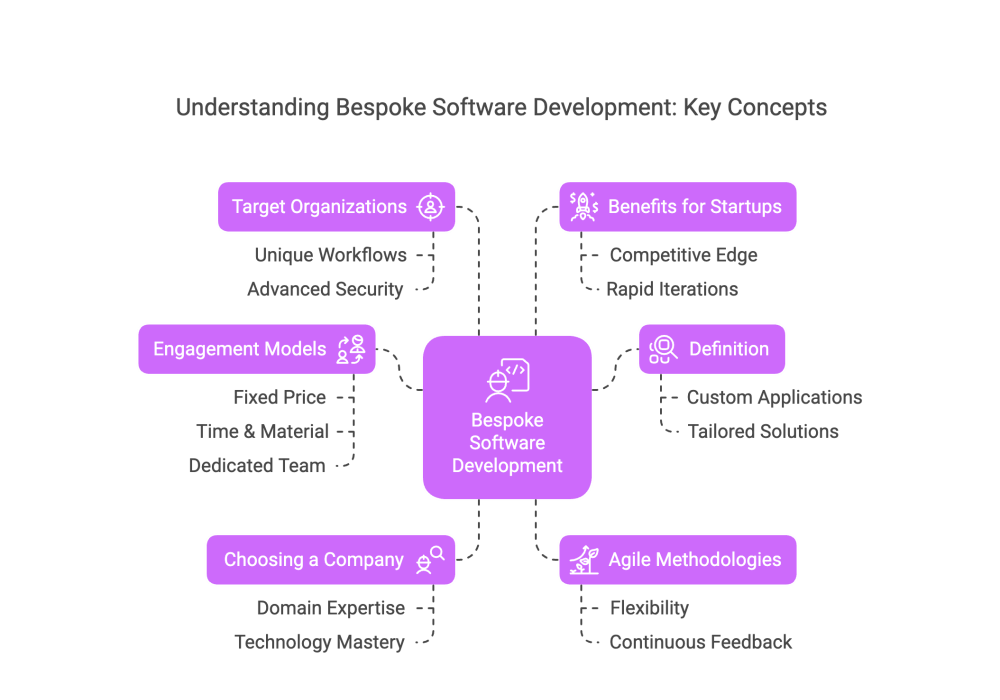

Conclusion
Bespoke software development remains the gold standard for organizations that require a tailor-made application to drive growth, efficiency, and customer satisfaction. By aligning each function with your business workflows, a custom solution reduces operational clutter, enhances security, and delivers a superior return on investment.
In 2025’s dynamic environment—characterized by remote teams, advanced analytics, and agile processes—successful bespoke engagements require thoughtful planning, clear scope definition, and a strong partnership with a development company that understands your industry. Whether you need a streamlined internal tool or an ambitious multi-department platform, bespoke software development bridges technology with strategic impact, positioning your business for long-term success.

Get in Touch With Us
At Cognativ, we specialize in developing bespoke software solutions tailored to your organization’s unique needs. Our team of experts works closely with you to design, build, and deploy custom applications that streamline operations, enhance security, and drive competitive advantage.
If you’re ready to explore how a tailor-made solution can transform your business and deliver long-term value, contact us today. Let’s work together to build technology that not only meets your current requirements but also adapts to future challenges and opportunities.
